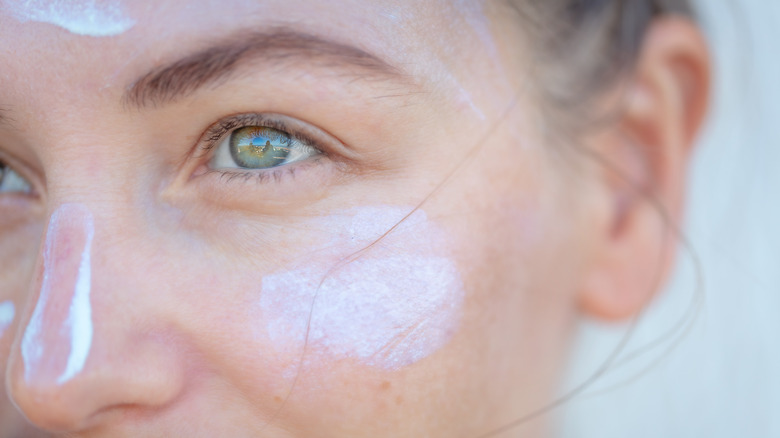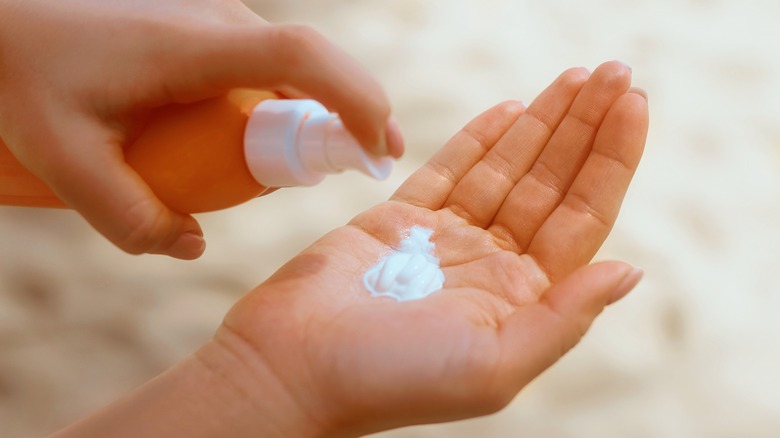Tips For Choosing The Right Sunscreen For Your Face
When you're planning for your beach trip, do you think about what kind of sunscreen you'll bring along with you? Or do you just grab the nearest bottle and slather on whatever's in it? While it's good to get some skin protection regardless, you might want to double-check what kind of sunscreen you're buying — especially regarding your face.
By now, it's common knowledge: sunscreen is a crucial step in any skincare routine. The American Academy of Dermatology warns that you should never use sunscreen below 30 SPF, regardless of which body part you're using it for. However, cream sunscreen is ideal for your face, since it provides the most coverage and protection.
But everyone's skin is different, and contrary to what some might believe, not all sunscreens share the same formula. Though they protect you from cancerous UV rays and keep your skin healthy, different skin textures and tones have different needs.
The different types of sunscreen
Sunscreen, for your face and body alike, can be broadly divided into two types: mineral and chemical. There are several differences between the two, but the main distinction is found in how they work. There are pros and cons to both, and the decision of which to use ultimately lies with the user and their specific skin type.
A more accurate term for mineral sunscreen would be sunblock. It acts as a shield on your skin, actively blocking any UV rays from penetrating it. The key ingredient in many of these sunblocks is zinc oxide, which tends to be gentle on the skin. These sunscreens are very effective — when applied properly. The problem is, it can be difficult to do so. More time is needed to fully spread the sunscreen across your whole face and body, to ensure full coverage.
Chemical sunscreen is preferred for its easier application. The chemicals within the sunscreen — such as oxybenzone, homosalate, and octisalate — absorb UV rays before your skin as a chance to. Most people's concerns regarding chemical sunscreen lie within the chemicals themselves. While certain carcinogenic chemicals like benzene have been found in some sunscreens, these products have since been recalled, and there is yet to be evidence of any more dangerous chemicals found in sunscreen. Still, it is always best to exercise caution.
Which sunscreen is right for your skin?
If you have sensitive skin, you know all too well the daily struggles of finding a skincare product that's right for you. Clinical dermatologist Christina Lam told BU Today that "sunscreens with zinc oxide or titanium dioxide tend to be better tolerated by folks with sensitive skin." This means mineral or non-comedogenic sunscreens, which will keep your pores open, giving your skin all the breathing room it needs.
If you have dry skin, you have a bit more flexibility afforded to you. There's no need to return the bottle you already bought — no sunscreen is more likely to dry out your skin than another. However, you might want to add an extra step to your morning skincare routine. Before you apply your sunscreen, break out the moisturizer (or, if you want to try something new, batana oil that protects against UV rays). Wait for your skin to absorb it before putting on the sunscreen. This will give your skin that extra hydration it needs, while still protecting it from the sun's rays.
Those with a darker skin tone will want to avoid mineral sunscreen, since it doesn't blend as well on darker skin, and can leave your face with a grayish tint. Sunscreens with chemical formulas don't have this effect but can irritate sensitive skin. Luckily, tinted mineral sunscreen is out there, which will blend better with your complexion and help you avoid any unwanted effects from its chemical counterpart.


